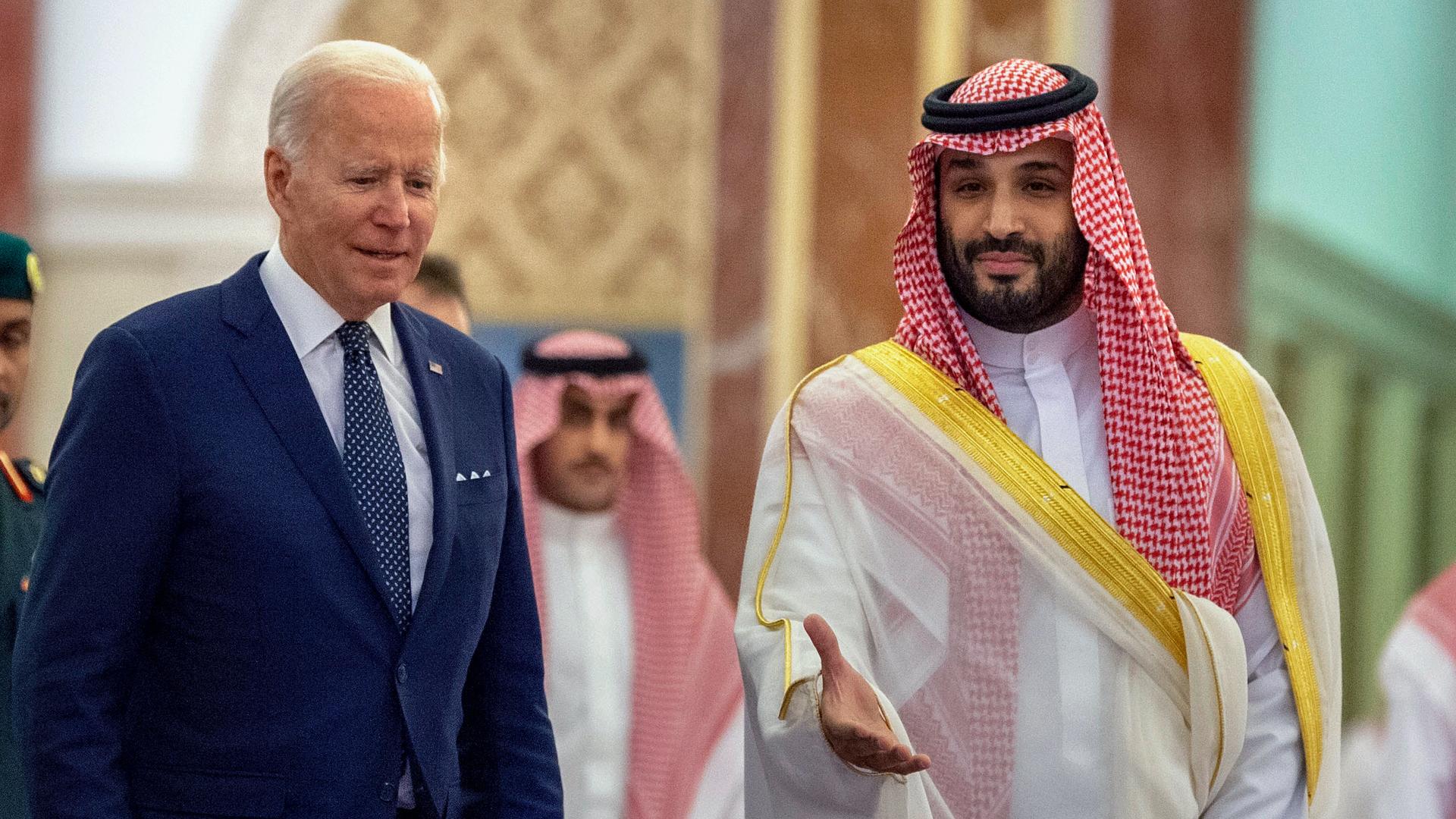Experts question what the US will get out of Biden’s visit to Saudi Arabia
President Joe Biden, who arrived in Saudi Arabia on Friday for the first time since he took office, met with King Salman and Crown Prince Mohammed bin Salman.
Even before Biden met face-to-face with MBS, Saudi Arabia was the clear winner in this diplomatic exchange, according to Andreas Krieg, who teaches conflict and security at King’s College London.
“For Biden to actually come, to undermine his own campaign promise of ostracizing or making MBS a ‘pariah,’ for him to now go to Saudi Arabia and shake hands [per se] with the crown prince, [this was] already a success [for Saudi Arabia],” Krieg said.
Actually, there was a fist bump between the two leaders on Friday, not a handshake, at least on camera. But Krieg said that the crown prince has won back some of the legitimacy that he lost in the wake of the 2018 murder of Washington Post columnist Jamal Khashoggi, according to American intelligence agencies, by Saudi agents at the behest of the crown prince.
MBS didn’t have to pay much back in return during their visit, Krieg said. Biden is facing political and economic challenges and low approval ratings at home. So, he has decided to set aside human rights concerns raised by Khashoggi’s murder, she said, to try to lower gas prices before the US midterm elections.
But Saudi Arabia has already increased its production, and experts say it is unlikely to start pumping more oil into global markets.
Meanwhile, for Saudis like Lina al-Hathloul, whose sister, a women’s rights activist, was detained for nearly three years in Saudi Arabia, Biden’s past words about holding the crown prince accountable ring hollow today.
“If President Biden truly wants stability in the region, he must hear the people’s voices,” Hathloul told the audience at a forum run by The Project on Middle East Democracy in Washington, DC, earlier this week.
Next to her sat Maryam al-Khawaja, a Bahraini human rights defender whose father, a political activist, was sentenced in 2011 to life in prison in the Gulf country of Bahrain.
Khawaja asked rhetorically if the US president would meet with political prisoners in Saudi Arabia or whether he would speak with detainees’ family members who have been banned from traveling as a punishment.
To Khawaja, Biden’s trip to Saudi Arabia sends a clear message — “That your human rights do not matter. As a population, your governments matter, your monarchies matter, but you as a people, you don’t exist.”
The activists speaking at the forum this week included Sanaa Seif, sister of Alaa Abd el-Fattah, an imprisoned Egyptian writer who has been on a hunger strike for 100 days.
They said that they requested a meeting with Biden before his trip, but didn’t get one.
Charles Dunne, a former senior diplomat, now nonresident scholar at the Middle East Institute, said that Biden’s backpedaling on human rights puts him in a weaker position on this trip.
“He now needs the Saudis more than they need him. And so, the president is going there at somewhat of a disadvantage, having promised that he’d make the Saudis a pariah because of their human rights violations,” Dunne said.
Saudi and American leaders have plenty of other things to discuss. Iran is at the top of their agenda.
There are talks about a defense alliance that would include the Israelis, alongside Gulf countries, and the US, pooling together security resources against the common adversary of Iran.
“The Israelis have demonstrated time and time again in the last few years their intelligence reach and capabilities into Iran are quite considerable, and this is a huge asset to Saudi Arabia’s own security interests,” Dunne explained.
The Saudis are looking to consolidate regional alliances, according to Dania Thafer, director of the Gulf International Forum based in Washington. Saudi’s interest in strengthening regional ties got more attention, Thafer said, in 2019, when the Trump administration decided not to respond to attacks carried out by Yemen’s Houthi rebels on Saudi oil facilities.
“They [Saudis] took this as the US [was] not interested in maintaining their security,” Thafer said, “so there has been a shift now to more regionalized security arrangements.”
She pointed to the 2020 Abraham Accords as an example. Those agreements normalized relations between Israel and several Arab countries. She said the Saudis have also been looking to get closer to other powers such as Russia, and the crown prince doesn’t seem particularly interested in helping Biden and the Democrats win the midterm elections in the US “since he had a much better relationship with the Republican party and the past president.”
Friday’s Biden-MBS fist bump will help the crown prince both domestically and internationally, experts said. It is not clear, though, what the US comes away with.
“It’s a superpower in decline that is coming to a region without a clear strategy, without a clear vision, where Middle Easterners are asking themselves what is America actually still delivering?” Krieg said.
